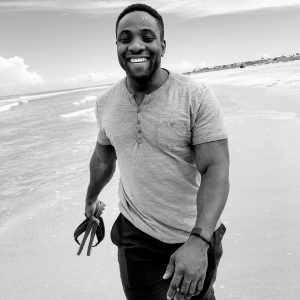Each week, SFRC highlights a fantastic student or alumnus for #FeaturedStudentFriday. Today’s student is Forest Resources and Conservation PhD Candidate David Hanson.

What’s the best thing about your current position?
As a PhD candidate, the best thing is that the end is near! Trust me, it has been some journey. As an emerging researcher, it is certainly a learning experience to go through the process of developing research questions, collecting data, analyzing and writing. As a graduate student, it is quite fulfilling to interact with my peers, faculty, undergrads and staff.
How did you decide to continue into a graduate program?
I am naturally curious. My parents always made education a priority for us, so grad school is the next progression to that learned life.
Was there any key thing that set you on the path towards SFRC?
The applied and interdisciplinary nature of SFRC is really attractive. I liked Geography, where I got my Masters, for the same reason. It’s where I feel the best fit.
What drives you? Why is this important or significant to you personally?
As mentioned before, I am generally curious. I want to know stuff. Also, the world is made up of some really smart people. There is always someone who knows a bit more about something than you. So if you find yourself consistently being the smartest person in the room or your social network, get out! Always stay learning.
What were your struggles to get where you are today?
Grad school, especially the PhD, is a nonlinear journey. I switched from Geography as a 6th year PhD candidate to SFRC. I had to start it all over. But I set a goal to be in and out in roughly 3 years…and I am well on my way to achieving that. Life happens. You just have to be resilient and adaptable. A mantra from one of my favorite books, The Road: keep that fire, even on bad days…and there are many.
What advice would you give to a younger you?
Anything from your class can be turned into a publication. I got mostly As throughout grad school and did good work but I was never pushed or had ‘pub eyes’. I didn’t always recognize the opportunities to publish. So put on your pub eyes when you take classes, read or collect data. Another advice would be to build your social network, not only with your peers at school but also folks from all walks of life. During my time here in Gainesville, I cannot tell you how many times I got help or a different perspective from my non-academic peers. Finally, find that work/life balance. You are human and not a robot. Explore new places and activities. Maybe you have a creative side. Don’t lose that. All work and no play is real. But all play makes you lose your way.
Do you have any favorite memory of your time at SFRC?
As Secretary of the Forestry Graduate Student Organization, I helped organize the annual graduate symposium. The level of planning and behind the scenes work is extraordinary but at the end of the day, it was a really cool experience. Still, during my remaining time in SFRC, I am hoping to add to my favorite memories list.
Are you working on anything exciting you’d like to share?
I research how university faculty and graduate students communicate and engage with nonscientific audiences. This can generally take the form of science communication, citizen science, cooperative extension… These activities can vary by project goals, level of public involvement, desired outcomes etc but they all share that common factor of wanting to bring science into familiar and new spaces. One of the exciting things about this is that the people I have interviewed are really excited about it. For most, public engagement is their passion project! I also have a budding interest in exploring diversity in the outdoors. So I am finding ways to tie this in with my graduate certificate in Environmental Education and Communication. But that’s an ongoing project.
 0
0
